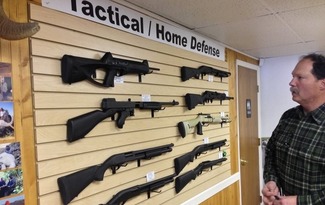A Washington Post article,
"Why the American Public Isn't mad As Hell About the Failure Of the Gun
Bill (In Numbers)" by Chris Cillizza and Sean Sullivan on April 24,
2013 discusses the failed Manchin-Toomey gun control amendment and the
American public's reaction to it.
Presumably the Washington Post, and major news publications like them, hold themselves to a strict standard of journalism that embodies fact-checking and accurate reporting on any issue as a matter of integrity. It may be shocking to some, then, to learn that the linked sources that provide the basis for the claims in the Cillizza and Sullivan article are misleading. The end result — either from willfully misrepresenting the original sources, or resulting from sloppy or yellow journalism — is that the reader is misled on the question about the percentage of Americans that supported unconditional expanded (often referred to as universal) background checks, and by extension the Manchin-Toomey amendment.
Cillizza and Sullivan's Washington Post article reports that according to a Washington Post-Pew Research Center poll, 47% of American's are 'net' angry or disappointed versus 39% 'net' happy or relieved. Technically, a closer look at the poll shows just 15% are "angry", while 20% are "very happy"; the rest fall into "relieved", "disappointed", "indifferent" and "no opinion."
The authors go on to say: "That's a far cry from the 90-ish percent that support expanding background checks — the centerpiece of the proposed legislation — enjoyed."
The first observation of this statement "expanded background checks" is that the word "expanded" is not synonymous with "universal" — as many referred to the legislation by.
Second, there are no qualifications to the statement, or explanation of what precisely "expanded" means. Does it mean no private sales at all? Just all gun show sales required to have background checks? No private transfers to family members? Does it mean everyone registers all guns in a national registry? These possibilities have all been suggested in the gun debate, so clarification as to what is meant in stating that 90% of Americans support "expanded" background checks is warranted.
Third, if one follows the link for the cited source behind the statement "That’s a far cry from the 90-ish percent support that expanding background checks," it leads to another Washington Post article: "90% of Americans want expanded background checks on guns. Why isn’t this a political slam dunk?" by Scott Clement.
Clement's article says: "Nine in ten Americans support expanding background checks on gun purchases in a recent Washington Post-ABC News poll, an extraordinary level of agreement on a political issue and a finding that’s been duplicated in nearly every major public poll. Surveys show broad support spans gun owners and non-gun owners alike, Democrats and Republicans, and even among members of the National Rifle Association, whose leadership is leading efforts to spike the measure from pending legislation."
This statement "nine in ten" from the Washington Post-ABC News poll is where Cillizza and Sullivan (the "Mad as Hell" article authors) base their claims. Again, no criteria or qualifications are provided, just simply "expanded" background check. However, deeper analysis (simply clicking on the link) shows the Washington Post-ABC News poll question is actually "Q: Would you support or oppose a law requiring background checks on people buying guns at gun shows?"
So "expanded" is narrowly defined in the Washington Post-ABC News poll as "requiring background checks on people buying guns at gun shows." Therefore, if the proposed legislation narrowly expands background checks to just people buying guns at gun shows, legislators could expect to receive 90% of the American public's support. But if the proposed legislation involved more than just expanding background checks to "people buying guns at gun shows," then the claim that 90% of Americans support it is bogus. Support or oppose, the Manchin-Toomey proposed legislation included many more things than just "expanding" background checks at gun shows, according to a summary of the legislation on Senator Toomey's website. Many of the summary points sound good to this author, though as they say "the devil is in the details". At any rate, to define the proposed legislation "expanded background checks" is misleading, and that is what the cited survey question asked. To claim that because 90% of Americans support expanded (though undefined) background checks at gun shows means that 90% of Americans should be mad as hell about the failure of Manchin-Toomey's amendment is misleading.
Cillizza and Sullivan are either not bothering to click on two links to fact-check what the survey actually says, or they are calling it "close enough" (i.e. that 90% of Americans supporting expanded background checks at gun shows is close enough to supporting all of Manchin-Toomey's amendment). The Washington Post — as well as anyone and everyone engaging in debating as emotional of a topic as gun control is — ought to accurately cite facts. Major news outlets have an additional obligation to accurately report. People believe them to be impartial and credible. Articles with loosely cited sources damage that reputation.


Follow Me on Twitter: https://twitter.com/2AFight
Follow Me on Facebook: https://www.facebook.com/2ndAmendmentFight
This article also appears on PolicyMic. (Original publication April 25, 2013).
Presumably the Washington Post, and major news publications like them, hold themselves to a strict standard of journalism that embodies fact-checking and accurate reporting on any issue as a matter of integrity. It may be shocking to some, then, to learn that the linked sources that provide the basis for the claims in the Cillizza and Sullivan article are misleading. The end result — either from willfully misrepresenting the original sources, or resulting from sloppy or yellow journalism — is that the reader is misled on the question about the percentage of Americans that supported unconditional expanded (often referred to as universal) background checks, and by extension the Manchin-Toomey amendment.
Cillizza and Sullivan's Washington Post article reports that according to a Washington Post-Pew Research Center poll, 47% of American's are 'net' angry or disappointed versus 39% 'net' happy or relieved. Technically, a closer look at the poll shows just 15% are "angry", while 20% are "very happy"; the rest fall into "relieved", "disappointed", "indifferent" and "no opinion."
The authors go on to say: "That's a far cry from the 90-ish percent that support expanding background checks — the centerpiece of the proposed legislation — enjoyed."
The first observation of this statement "expanded background checks" is that the word "expanded" is not synonymous with "universal" — as many referred to the legislation by.
Second, there are no qualifications to the statement, or explanation of what precisely "expanded" means. Does it mean no private sales at all? Just all gun show sales required to have background checks? No private transfers to family members? Does it mean everyone registers all guns in a national registry? These possibilities have all been suggested in the gun debate, so clarification as to what is meant in stating that 90% of Americans support "expanded" background checks is warranted.
Third, if one follows the link for the cited source behind the statement "That’s a far cry from the 90-ish percent support that expanding background checks," it leads to another Washington Post article: "90% of Americans want expanded background checks on guns. Why isn’t this a political slam dunk?" by Scott Clement.
Clement's article says: "Nine in ten Americans support expanding background checks on gun purchases in a recent Washington Post-ABC News poll, an extraordinary level of agreement on a political issue and a finding that’s been duplicated in nearly every major public poll. Surveys show broad support spans gun owners and non-gun owners alike, Democrats and Republicans, and even among members of the National Rifle Association, whose leadership is leading efforts to spike the measure from pending legislation."
This statement "nine in ten" from the Washington Post-ABC News poll is where Cillizza and Sullivan (the "Mad as Hell" article authors) base their claims. Again, no criteria or qualifications are provided, just simply "expanded" background check. However, deeper analysis (simply clicking on the link) shows the Washington Post-ABC News poll question is actually "Q: Would you support or oppose a law requiring background checks on people buying guns at gun shows?"
So "expanded" is narrowly defined in the Washington Post-ABC News poll as "requiring background checks on people buying guns at gun shows." Therefore, if the proposed legislation narrowly expands background checks to just people buying guns at gun shows, legislators could expect to receive 90% of the American public's support. But if the proposed legislation involved more than just expanding background checks to "people buying guns at gun shows," then the claim that 90% of Americans support it is bogus. Support or oppose, the Manchin-Toomey proposed legislation included many more things than just "expanding" background checks at gun shows, according to a summary of the legislation on Senator Toomey's website. Many of the summary points sound good to this author, though as they say "the devil is in the details". At any rate, to define the proposed legislation "expanded background checks" is misleading, and that is what the cited survey question asked. To claim that because 90% of Americans support expanded (though undefined) background checks at gun shows means that 90% of Americans should be mad as hell about the failure of Manchin-Toomey's amendment is misleading.
Cillizza and Sullivan are either not bothering to click on two links to fact-check what the survey actually says, or they are calling it "close enough" (i.e. that 90% of Americans supporting expanded background checks at gun shows is close enough to supporting all of Manchin-Toomey's amendment). The Washington Post — as well as anyone and everyone engaging in debating as emotional of a topic as gun control is — ought to accurately cite facts. Major news outlets have an additional obligation to accurately report. People believe them to be impartial and credible. Articles with loosely cited sources damage that reputation.
By Matt MacBradaigh. Matt
is a Christian, Husband, Father, Patriot, and Conservative from the
Pacific Northwest. Matt writes about the Second Amendment, Gun Control,
Gun Rights, and Gun Policy issues and is published on The Bell Towers, The Brenner Brief, PolicyMic. TavernKeepers, and Vocativ.
Follow Me on Twitter: https://twitter.com/2AFight
Follow Me on Facebook: https://www.facebook.com/2ndAmendmentFight




No comments:
Post a Comment